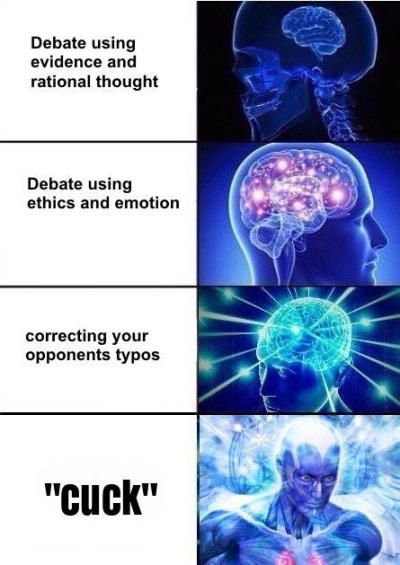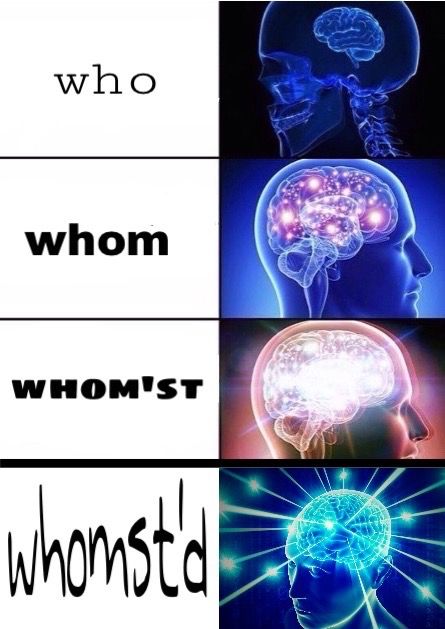
A few weeks ago, posters on 4chan and Tumblr began bragging — ironically, sort of, as all things on 4chan and Tumblr are — about the size of their brains. Because this is how they communicate with one another, the channers and Tumblr bloggers bragged in the form of memes: smart-sounding but nonsensical linguistic escalations, from “who” to “whom” to “whomst,” and depictions of a character known as Feels Guy, or Wojak, who has a comically large brain; images that demonstrated the intelligence of whoever wielded said images.
Since then, the idea of ever-evolving intelligence has itself evolved, spreading across the memescape from Tumblr and 4chan to Twitter, in the form of what has become known as the “Expanding Brain” meme. The “Expanding Brain,” so far the most popular of the “levels of intelligence” genre of meme, is an image macro that uses New Age depictions of what happens inside your skull to show the difference between sheeple and the truly enlightened — from ordinary brain to universe-enfolding Vitruvian Man.

Brain memes, like the Wojak variant, have their origin in the “Whomst” progression, an escalating, ridiculous series of not-quite-words that make someone sound smarter. Just as using “whom” instead of “who” makes one sound exponentially smarter, “whomst’d’ve” makes you sound like an omega-level mutant capable of warping reality with your powerful brain. From there, iteration changed the brain meme from one about intelligence and pretension to one about the very nature of argument itself.
One of the predecessors and close cousins of these brain memes is an image macro known as “layers of irony,” a four-panel comic that follows a set form, always beginning with a disembodied head that one can only describe as “very vaporwave” asking, “how many layers of irony are you on?” The idea here is that being ironic online has no upper bound, that there is always another layer of irony to enfold oneself inside.
Memes have often divided readers into tiers — those who know or understand something, and those who don’t. It’s why the most viral of them strive to be “relatable” — specific descriptions of near-universal experiences. For a while now, internet communities have tossed around half-tongue-in-cheek diagrams of “levels” of fandom or hipsterism, with everything from classical music (from Mozart, the most basic, to the notoriously difficult composer Karlheinz Stockhausen) to leftism (John Oliver at “Level 1,” Maoism at “Level 5,” all the way up to “mandatory gay married” at “Level [infinity symbol]”).

The brain meme takes this kind of social sorting and presents it in an easy-to-understand diagram. But it’s also itself evolved — from a meme about raw intelligence to a meme about argumentative sophistication. The latest brain memes draw strength from the very structure of the web-content economy itself — the never-ending shouting match across social networks that is colloquially referred to as the Discourse. First and foremost, these memes encompass the many stages of a topic’s life on social media. Its breakout, the backlash, backlash to the backlash, and the counterintuitive take nobody was really looking for. Why spend days waiting for a new #slatepitch when controversies can simply be gamed out and packaged into a sort of reader’s-digest version of the Discourse?
If you like something, you can be sure that someone will pipe up to say, “Actually, it’s bad, and that makes me smart”; and then someone will pipe up to say, “Actually it’s good … because it’s bad.” Whoa.
Maybe more than anything else, the brain meme works because it speaks in the low-rent visual language of scammy web ads. Its use of homeopathic imagery and medical stock imagery from places like Shutterstock reflects the aesthetic of the conspiratorial woo-woo social-media brands that warn Facebook users about Monsanto and Reptilians. The very idea of boosting past one’s physiological limits is why people keep falling for “Limitless pills,” and trying out nootropic stacks from InfoWars. The myth that we only use 10 percent of our brain is pervasive in pop culture, even if that myth is false, and ads for cognitive enhancement often rely on imagery of a glowing brain to rope in new marks. Looking at one of these brain memes is like watching the supposed effects of nootropics happen all at once — in which the meme’s writer can simultaneously see the present, as well as the near and distant futures.
This is a potent stew of internet-familiar references: the snippy need to be right online, the quixotic search for a perfect nootropic stack, the jockeying for position in the eternal tournament of irony, and the glowing aesthetics of vaporwave. You don’t have to recognize all of these ideas to like it. But you can’t reach the full astral-thought-projection level if you don’t.





























